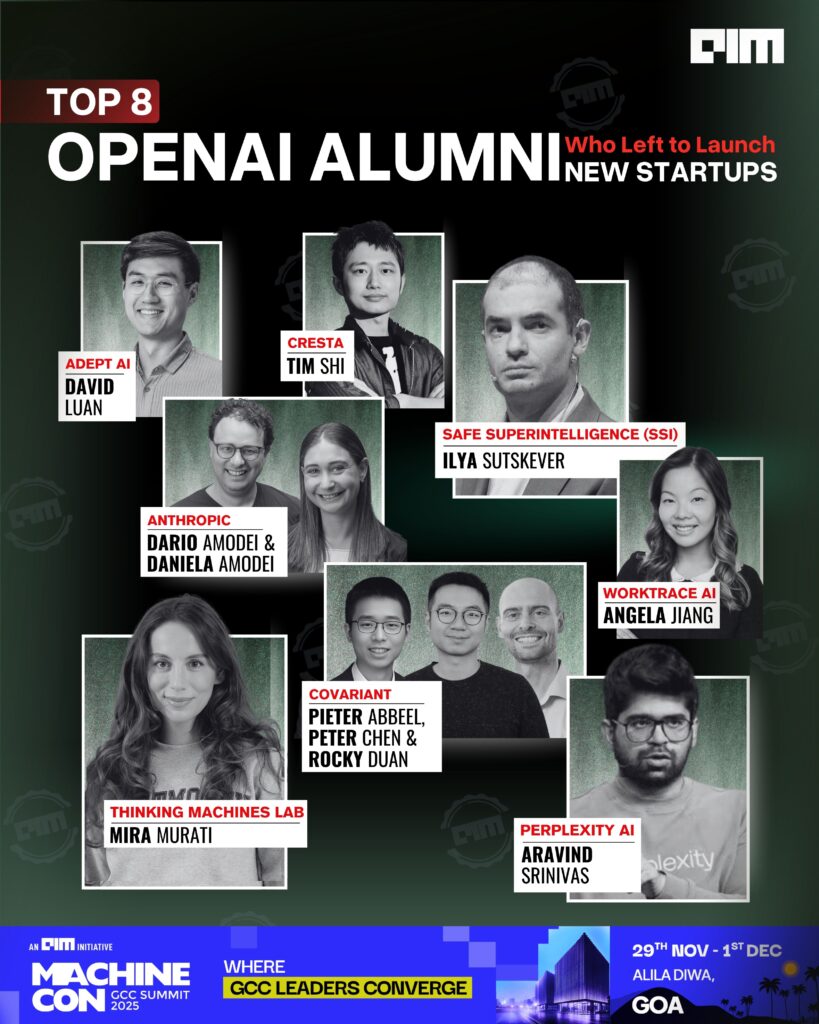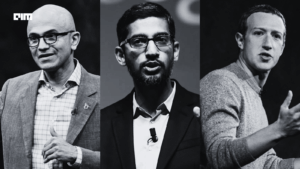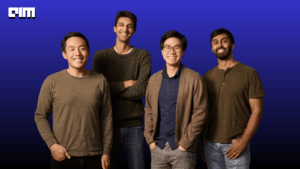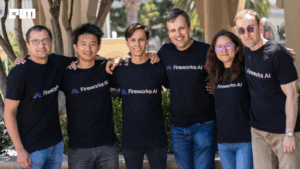The OpenAI Mafia is real. Over the past three years, the company’s most ambitious researchers, strategists, and product visionaries have quietly walked out the door to launch startups that are worth billions today. They’re building the future OpenAI never had time to explore: safer superintelligence, robotics with reasoning, enterprise automation that works, and AI that remembers.
These founders didn’t leave OpenAI because they lacked ambition. They wanted to build their own vision, not execute someone else’s. Some even walked away from nine-figure equity packages. All of them chose the harder path. Building from scratch in a world where OpenAI had already won.
Yet their startups are now worth billions, drawing investments from the same firms that back OpenAI itself. They’ve proven that the future belongs to people willing to ask what comes next, and bold enough to build it themselves.

1. Ilya Sutskever, Safe Superintelligence (SSI)
Once OpenAI’s co-founder and chief scientist, Ilya Sutskever is now at the helm of Safe Superintelligence, a company with a focus on building superintelligent AI with a safety-first mission.
After his seismic exit from OpenAI amid internal turmoil, Sutskever put together a small elite team in Palo Alto and Tel Aviv to address one of AI’s deepest questions, how to pursue superintelligence while minimizing existential risks. Operating in stealth and with $3 billion raised, Sutskever’s SSI is pushing for AI systems “aligned with human values,” attracting the attention and investment of Silicon Valley’s top firms.
Industry watchers now see SSI as one of the world’s most well-funded and closely guarded AI labs, with Sutskever determined that his company’s work will remain focused on safety rather than product cycles or commercial pressure.
2. Dario Amodei, Daniela Amodei, Anthropic
Siblings Dario and Daniela Amodei left OpenAI with a group of top researchers to found Anthropic in 2021, setting a new bar for responsible large-scale AI development. Now backed by Google and Amazon, Anthropic’s PBC status ensures its mission serves “the long-term benefit of humanity.”
The Amodei’s have become public faces for explainable and steerable AI, addressing the opacity of language models and driving next-gen research on interpretability and safety. Their flagship model, Claude, routinely challenges the boundaries of what language models can do with trust and transparency.
Anthropic’s annual revenue run rate reached $5 billion (up from $1 billion at the start of 2025), serving over 300,000 business customers with a 7x increase in large accounts year-over-year. Claude Code, the company’s primary revenue driver, reached $500 million+ in run rate. Since inception in 2021, Anthropic has raised over $33.7 billion total.
3. Mira Murati, Thinking Machines Lab
Mira Murati, OpenAI’s acclaimed CTO and briefly its interim CEO, launched Thinking Machines Lab to address the gap between advanced model capabilities and real-world, customizable solutions. With a team of powerhouse researchers and a $2 billion seed round at a $12 billion valuation, Murati’s startup is dedicated to creating multimodal systems that collaborate directly with humans and unlock scientific and engineering breakthroughs.
Thinking Machines Lab’s first product, Tinker, launched in October 2025, allows researchers and startups to fine-tune cutting-edge open-source models like Meta’s Llama and Alibaba’s Qwen through supervised and reinforcement learning with just a few lines of code. Users can download and deploy customized models anywhere, democratizing capabilities once gatekept by top research labs.
The company raised $2 billion from Andreessen Horowitz, Nvidia, Accel, ServiceNow, Cisco, AMD, and Jane Street, a record-breaking seed round for an early-stage company with no prior revenue. Murati’s leadership and her belief in AI as a tool for personal agency and open research are carving out new territory for startup-led innovation in frontier AI.
4. David Luan, Adept AI
Adept AI, co-founded by former OpenAI VP of engineering David Luan, is building next-generation agents designed to understand natural language and operate software with seamless intelligence.
Unlike conventional chatbot approaches, Adept uses transformer-based models to teach AI agents how to execute tasks across varied enterprise applications, sometimes on par with highly trained human assistants. The agent recognizes screen elements through computer vision, performs mouse clicks and typing, and coordinates actions across multiple applications, from importing LinkedIn URLs into recruiting software to researching information online and setting up spreadsheets.
The company raised $350 million in Series B funding (March 2023) at a $1 billion valuation, led by General Catalyst and Spark Capital, with strategic backing from Microsoft, Nvidia, Workday, and Atlassian, and is fast becoming a hub for research on tool use and agentic workflows in artificial intelligence.
5. Aravind Srinivas, Perplexity AI
Perplexity AI, the answer engine and conversational search platform, was founded by Aravind Srinivas after his research stint at OpenAI. The startup has rapidly scaled as an alternative to traditional search, offering precise, multi-modal answers powered by advanced generative models.
Perplexity emphasizes source-cited results and interactive exploration, bridging the gap between generative AI and trustworthy information retrieval. Srinivas built Perplexity specifically to eliminate hallucination in LLMs by adhering to a core principle: never generate information you didn’t retrieve. For developers and knowledge workers, Perplexity eliminates the need to cross-reference multiple tabs and outdated sources.
The platform now serves 30 million monthly active users, processing 780 million queries monthly (up from 230 million in August 2024), and has achieved an annualized run rate of $148 million in revenue as of June 2025.
6. Tim Shi, Cresta
Cresta, founded by OpenAI early team member Tim Shi, applies AI to optimize and coach customer service and sales teams in real time. Shi’s vision was to leverage machine learning for human performance enhancement, blending agent-assist and automation at scale. With substantial venture backing, Cresta is now recognized as a leader in AI-powered enterprise productivity, serving thousands of agents across Fortune 500 clients.
Cresta’s core innovation is Ocean-1, a foundational model purpose-built for contact center interactions, trained on millions of real customer conversations. Ocean-1 combines base LLMs (Claude, Falcon-40B, GPT-4) with domain-specific fine-tuning to optimize for three critical outcomes: accuracy in contact center workflows, instruction adherence through feedback learning, and ultra-low latency for real-time guidance.
The company has raised $270 million+ across multiple funding rounds, with Series D closing at $125 million (November 2024), and counts Sequoia, Greylock, Andreessen Horowitz, and SoftBank as lead investors.
7. Pieter Abbeel, Peter Chen, Rocky Duan, Covariant
Founded in 2017 by Ex-OpenAI researchers Pieter Abbeel, Peter Chen, and Rocky Duan, Covariant is pioneering general-purpose AI for robotics, with a focus on industrial automation and warehouse fulfillment. Covariant’s flagship platform, the Covariant Brain, leverages the RFM-1 foundation model, trained on the world’s largest dataset of real warehouse robotics interactions to enable robots to see, reason, and act in unpredictable environments.
Unlike traditional automation systems that require custom coding for new tasks, Covariant’s robots can learn by instruction through natural language prompts and video modeling. RFM-1 allows warehouse operators to “teach” robots new workflows with plain English, handle exceptions, and optimize motion strategies without software rewrites.
Covariant is powering thousands of robots for Fortune 500 logistics firms (including ABB, KNAPP, Bastian, and Obeta), and has achieved 6x deployment growth from 2022 to 2023, with major case-picking and order-sortation solutions in apparel, health & beauty, pharmaceuticals, and grocery verticals. In August 2024, Amazon hired all three founders and licensed Covariant’s robotic foundation models (RFM-1), integrating them with Amazon’s own fulfillment robot fleet.
8. Angela Jiang, Worktrace AI
Angela Jiang, OpenAI’s third product manager and architect behind ChatGPT’s public rollout, founded Worktrace AI to automate enterprise workflows. The startup observes employee behavior to identify and automate repetitive digital tasks across business systems.
With backing from Mira Murati, ChatGPT lead Nick Turley, and the OpenAI Startup Fund, Worktrace AI is raising at a $50 million valuation. Worktrace AI’s core technology leverages memory-driven AI to learn how a business operates across software ecosystems, then quietly automates repetitive user workflows, empowering employees to focus on higher-value work.
As a former OpenAI product manager with hands-on experience launching foundational AI models used by millions, Jiang brings unique insight into both the technical and business challenges of deploying AI at scale.










